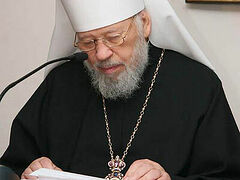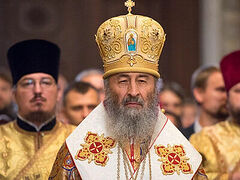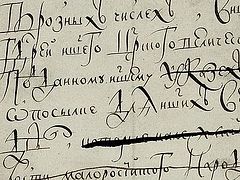Metropolitan Hilarion of Volokolamsk, the Chairman of the Moscow Patriarchate’s Department for External Church Relations, answered questions from the Greek newspaper Kathimerini on Metropolitan Onuphry, forced autocephaly, and Russian-Greek relations.
Part 1: The Lord Has Entrusted Us With a Church That Has Existed for 1,000 Years
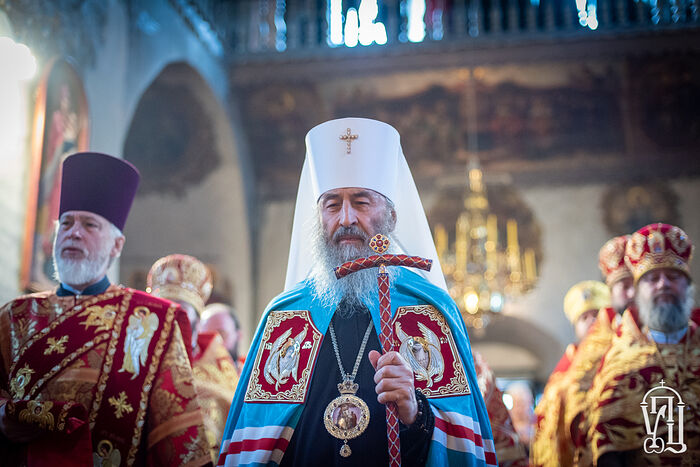 Metropolitan Onuphry of Kiev and all Ukraine
Metropolitan Onuphry of Kiev and all Ukraine
—You mentioned Vladyka Onuphry, his recognition, and so on. But then again, it’s often noted that in the 1990s, Metropolitan Onuphry himself signed the letter asking for autocephaly. Perhaps you just pressured him and forced him to stick to a position in favor of the Russian Orthodox Church?
—If you knew His Beatitude Metropolitan Onuphry, then you would understand that he is a person who cannot be pressured at all. He makes decisions as his hierarchical conscience tells him and as the Holy Spirit tells him.
What happened in the early 1990s? Philaret Denisenko, then the Metropolitan of Kiev in the Russian Orthodox Church, assumed he would become the Patriarch of Moscow and All Russia. He was already the locum tenens of the Patriarchal throne, but the Local Council did not elect him as Patriarch. He harbored great resentment and decided to become “patriarch” in Ukraine. Soon after his return to Ukraine, having secured the support of then-President Kravchuk, Philaret Denisenko demanded that the Ukrainian Church be given autocephaly. He convinced the episcopate of the Ukrainian Church that it was necessary to sign this letter.
Vladyka Onuphry was young then, just consecrated as a bishop. He signed the letter together with everyone, and then, when they began to understand, when they saw that it was all done to divide the Ukrainian Church from the Russian Church, that everything was happening under pressure from the secular authorities, the bishops one by one began to withdraw their signatures, including Bishop Onuphry, now His Beatitude, the Metropolitan of Kiev and All Ukraine.
If someone suggests that we are pressuring him now, well, excuse me, but we don’t have any means of doing so—neither political, nor financial, nor administrative. The Ukrainian Orthodox Church is self-governing, with its own episcopate, its own Synod, and they independently elect their bishops. The only thing that remains is the historical prayerful connection between the Ukrainian Church and the Russian Church, but the Ukrainian Orthodox Church doesn’t want to lose this connection, and therefore it doesn’t want autocephaly. Moreover, it doesn’t want autocephaly on the basis of schismatics. Therefore, statements that we are exerting some kind of pressure are absolutely untrue.
—Still, one of the arguments for autocephaly is that Ukraine has been an independent state for a long time now. Perhaps the Russian Orthodox Church just dreams of somehow preserving an empire that doesn’t actually exist?
—We’re not interested in any empire—we’re interested in the Church that exists in reality, that is, the united Russian Orthodox Church, which has more than 100 million faithful, more than 40,000 parishes, and about 1,000 monasteries. We want to preserve it regardless of what political borders arise on the canonical space of the Russian Orthodox Church.
Political borders have changed many times throughout the thousand years of the Russian Church’s existence, but we don’t believe the emergence of new borders should lead to the Church being divided up. Otherwise, we’d have to divide the Russian Church into fifteen parts, the Antiochian Church into two or three, the Church of Jerusalem into three or four, and the Alexandrian Church into more than fifty parts. After all, there are more than fifty states in Africa. Why is there only one Church?
Therefore, we don’t see the need to listen to political arguments. We have to listen to the will of the episcopate, the clergy, and the Church people. How did any autocephaly in Church history begin? With this or that Church declaring its desire to receive independence. This process did not always go smoothly. And unlike what the hierarchs of the Patriarchate of Constantinople are indoctrinating everyone with now, Constantinople certainly did not grant autocephaly in every case.
For example, the Russian Church did not receive any tomos of autocephaly from the Church of Constantinople. We’ve been living without such a tomos for more than 500 years now. The Russian Church proclaimed its autocephaly when the Patriarch of Constantinople signed the union with Rome, that is, there was not an Orthodox patriarch on the throne of Constantinople, but a Uniate patriarch. Then our bishops had to gather and elect their metropolitan without the sanction of Constantinople. Then the Patriarchate was established in Rus’, and when it happened, gramotas were received, signed not by the Ecumenical Patriarch alone, but by all the eastern patriarchs. They recognized the Moscow Patriarch as fifth in the diptychs, and recognized him precisely in the rank of patriarch.
Therefore, those who now tell us that the Patriarch of Constantinople, you see, had the right to grant autocephaly to Ukraine are incorrect. He had no such right. It cannot be done without the consent of the Ukrainian Church people and the Ukrainian episcopate, and without the consent of the Russian Church.
He deliberately violated the canons of the Church in order to harm the Russian Orthodox Church, as, unfortunately, has happened in the past. For example, when the revolution happened in Russia, the Renovationist schism emerged, and at first, then-Patriarch Meletios (Metaxakis) of Constantinople did not support this schism, but his successor Patriarch Gregory VII actually supported the Renovationists through his representative in Moscow.
We have documentary evidence of this. For example, a letter was sent to our Patriarch-confessor St. Tikhon, which said: “We suggest that you immediately renounce the Patriarchal throne and we consider that the Patriarchate in Russia should be abolished.” These actions were undertaken by Constantinople at a time when the Russian Church was facing persecutions that the whole world knew about. Our priests were being shot, our churches blown up, our monasteries destroyed—and the Patriarch of Constantinople supported the schism within the Russian Church.
And now the Patriarchate of Constantinople has supported the schism within the Ukrainian Church.
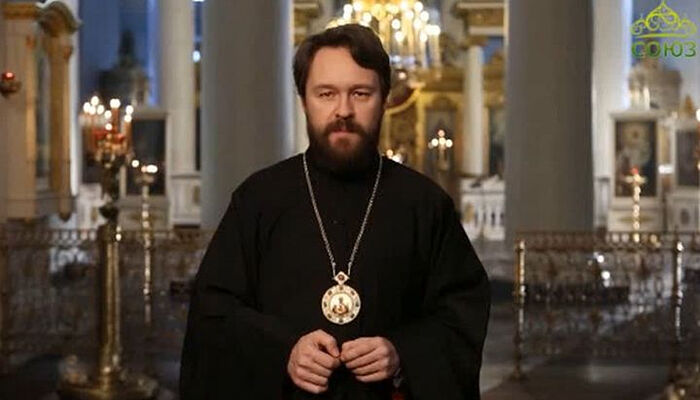 Metropolitan Hilarion (Alfeyev)
Metropolitan Hilarion (Alfeyev)
—You know that Constantinople accuses the Russian Orthodox Church of systematically undermining its ecumenical status, including by cultivating the theory of “Third Rome.” A whole book on this was published in Greece saying you want to somehow lead Orthodoxy in the world, because you have the largest flock. Is there any truth to this?
—There is not a single drop of truth in these claims, except that we are indeed the most numerous Church. This fact is not something we get proud about, but something that imposes great responsibility upon us for our flock, for preserving its unity.
If to touch upon the overblown mythology about the Russian Church, including the accusation that we supposedly preach the “Third Rome” theory, then provide at least one official document of our Church, one decision of our Church Council, the words of the Patriarch, or, for example, my speeches, which would say that we recognize Moscow as the Third Rome. There are none. This was an idea formulated several centuries ago and long since left in the past. It’s of no interest to us, as we have no desire to lead world Orthodoxy. We are quite satisfied with the place we occupy.
We officially recognized the primacy of the Patriarch of Constantinople when the document “On Primacy in the Universal Church” was written and adopted at the Bishops’ Council of the Russian Orthodox Church in 2013. It says there in black and white that we recognize the Patriarch of Constantinople as first among equals in the family of the primates of the Local Orthodox Churches. But we recognize him as first in honor, not first in power. We don’t believe that the Patriarch of Constantinople has any authority outside his canonical jurisdiction or has the right to interfere in the internal life of the other Local Churches—we categorically disagree with such ideas.
The document I’m talking about was adopted in 2013, when we were in unity with the Patriarch of Constantinople, but now this Patriarch is not to be found in our diptychs. Now there is a different ecclesiological situation, reminiscent of situations that arose in the past, for example, when Patriarch Nestorius of Constantinople was teaching in the fifth century that the Theotokos must be called the Christotokos. The Third Ecumenical Council was called, which the Patriarch of Constantinople certainly did not preside over. He was accused there and was condemned for his heresy. Then another Patriarch of Constantinople was elected. So, history knows situations when the Church existed without an Orthodox patriarch on the throne in Constantinople.
Let us also recall that in the mid-fifteenth century, the Russian Church became autocephalous because the Patriarch of Constantinople had signed the union with Rome; that is, at that moment, there was not an Orthodox patriarch on the throne in Constantinople.
The Russian Orthodox Church perceives today’s situation the same way. Many Orthodox believers are now saying there is no Orthodox patriarch in Constantinople because the Patriarch of Constantinople has joined the schismatics. All of Russia, the entire Russian Orthodox Church has seen pictures where Patriarch Bartholomew is concelebrating with the leader of the Ukrainian schism. I think this situation has a very adverse impact on the overall climate of inter-Orthodox relations. But I repeat: It’s incorrect to say that we break communion with one, another, or a third Church. We don’t break communion with Churches, but stand for the canonical tradition of the Church and uphold the unity of the Russian Orthodox Church. We will never depart from this path.
—You have often spoken about pressure from outside on the decisions of the Patriarch of Constantinople. As I understand it, you are referring to American diplomacy, which has made the topic of Ukraine one of its top initiatives. In the end, the Patriarch in Constantinople lives in an Islamic environment. He needs some kind of diplomatic support. He turned to the United States, for example. The Russian Orthodox Church also works very closely with the Russian government, with embassies, with the Minister of Foreign Affairs. Why can’t others work with state structures, but the Russian Orthodox Church can, for example?
—It’s very simple. Every primate of a Local Church decides who to work with. If such work is aimed at defending the interests of his Church, at preserving the unity of Orthodoxy, then why not work together? Why shouldn’t the Russian Church work with the Russian government in building churches in Russia, teaching theology in universities, in ensuring that people have free access to religion, to the Church?
If we were talking about the Patriarch of Constantinople working with the United States to preserve Orthodox sacred treasures, to defend its interests on its own canonical territory, would anyone object? I think not. But when the Patriarch of Constantinople relies on eternal forces for actions aimed at destroying Orthodoxy unity, at damaging the Local Orthodox Churches, of course we can’t agree with this. As for the Russian Orthodox Church, we’re not invading anywhere, not taking anything away from anyone. We only take care to preserve the Church we have received from our forebears.
***
Here the interviewer asks about Russia’s ties with Turkey and why more was not done about the recent Agia Sophia crisis. Metropolitan Hilarion notes that Patriarch Kirill was the first primate to speak out, then the Holy Synod expressed its concern, and then President Putin expressed concern directly to Erdogan. The conversion of Agia Sophia and the Chora Monastery into mosques is a great tragedy not only for the Patriarchate of Constantinople, but for all of Orthodoxy, Metropolitan Hilarion says.
***
—Let’s go back to history a bit. Next year, the 200th anniversary of the Greek uprising against the Ottomans for their freedom will be celebrated. Russia played a very important role in this uprising. What is Greece for Church people in Russia? What is the Greek Church and Greece? Despite all the problems, maybe something important enough remains that we are united?
*** Metropolitan Hilarion first speaks about what Greece means to him personally. ***
—If we’re talking about relations between our Churches and our people in general, I would like to express the hope that the Greek people will not forget the feat of the Russian soldiers who took part in the liberation of Greece from the Ottoman yoke, spilling their blood on the Greek land. I really hope that, despite the division that has arisen, we will be able to maintain our ties at the cultural, spiritual, and ecclesiastical levels. Yes, we had to break off relations with several hierarchs of the Greek Church now (hopefully temporarily), including its primate, but we maintain unity with many other hierarchs.
I hope we will celebrate all such significant dates together. Our Churches have gone through a very difficult history. The Russian Orthodox Church is a martyric Church. For seventy years, it suffered from the godless authorities. Practically all of our bishops and clergy were physically exterminated in the 1930s. Literally only a few remained alive. Many of our churches were blown up, closed, destroyed, and wiped off the face of the Earth. We have come through all of this, and for more than thirty years now there has been an unprecedented revival of Church life in Russia, Ukraine, Belarus, and in other countries of the Russian Orthodox Church’s canonical responsibility.
We very much hope that the sad events that have taken place in the Orthodox world will not destroy the centuries-old ties that exist between our faithful and between our peoples.
—Thank you, Vladyka, for this informative interview.
—Thank you, Athanasios.

